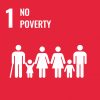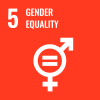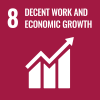Longdenville, Trinidad and Tobago – Among the colourful fabrics and sewing machines in Longdenville, a small town in central Trinidad and Tobago, Akila leans across her workbench, carefully smoothing the fabric of a blue top she is making, adjusting the hem, and strategically placing pins throughout. Alongside her is Yusmila, both women united by a shared dream: to gain skills that will provide their families with economic stability.
Akila, a 30-year-old Trinidadian mother of a 5-year-old girl, used to help her husband run his upholstery business. Eager to learn sewing, she enrolled in the Flourish Empowering Resilience and Integration programme, which brings together local and migrant participants and equips them with technical skills, boost confidence and foster empowerment. “I dream of creating clothes for myself and my daughter instead of buying ready-made garments. Who knows? This could be the start of my own little business!"
In 2019, Yusmelis, 43, left Venezuela for Trinidad and Tobago seeking a better future for her three children. She sees the training as an opportunity to broaden her skill set. “Many locals initially saw us as rivals for their jobs, but now, those who participate in our courses have come to understand our stories and actively support us. The training is an ice breaker," she says as she threads the sewing machine needle.

A participant in the sewing course skillfully operates a sewing machine. Photo: IOM/Gema Cortes

Every Saturday, around 45 participants enhance their skills in diverse skills classes like sewing, carpentry, and hydroponics. Photo: IOM/Gema Cortes

Akila stitches a blue top during training, surrounded by team mates. Photo: IOM/Gema Cortes

A sewing instructor teaches how to cut a top during a skills training session. Photo: IOM/Gema Cortes
Akila, Yusmelis and 15 other participants honed their skills on the machines. In a few days' time, they will put the finishing touches to the tops before taking them home.
Empowering women
At the helm of this initiative, supported by the International Organization for Migration (IOM), is Lucia Cabrera-Jones, the director of Women-Owned Media and Education Network (WOMEN). A Cuban migrant herself, she explains a holistic strategy to address the multifaceted challenges faced by both migrants and locals in the Chaguanas area of central Trinidad. “Troubles between migrants and locals often arise out of a misunderstanding of cultures,” she says. “The programme facilitates dialogue that fosters mutual understanding through shared experiences.”
In the last quarter of 2024, Trinidad and Tobago hosts approximately 36,000 Venezuelan migrants and refugees in search of a better life. For many, like Yusmelis, these capacity-building opportunities are an open door to labour and financial inclusion, fostering economic independence.

Lucia Cabrera-Jones engages with participants during a sewing training session. Photo: IOM/Gema Cortes

A participant in the sewing course meticulously draws a pattern. Photo: IOM/Gema Cortes

Vexti, a participant from Venezuela, dives into the world of hydroponic gardening. Photo: IOM/Gema Cortes

Participants plant seeds during the hydroponics training. Photo: IOM/Gema Cortes
“Inclusion and self-sufficiency are key for migrants and the communities that welcome them,” says Desery Jordan-Whiskey, IOM Officer-In-Charge in Trinidad and Tobago. “When migrants are given the opportunity to share their skills, it creates advantages for the economy, host communities, and migrants themselves." Since 2023, IOM has equipped nearly 1,450 migrants and local community members with essential skills facilitating pathways for sustainable employment or self-employment opportunities.
Building community through skill sharing
Around 45 participants engage in diverse classes ranging from sewing to carpentry and hydroponics every Saturday. These sessions are more than just skills-building, they serve as platforms for dismantling xenophobic and language barriers.
Vexti, a participant from Venezuela, is enthusiastic about the hydroponics system for growing plants without soil. She plans to set up a small version at home, and eventually expand it throughout Venezuela. The programme is helping her integrate into the community. “Mixing participants is a fantastic idea. It enables us to learn from the host community while they learn from us. I've also improved my English skills,” she says.


Participants learn carpentry at a skills training course. Photo: IOM/Gema Cortes

Amanda, a Trinidadian participant of the Flourish initiative, is learning carpentry at a skills training course. Photo: IOM/Gema Cortes

Participants explore innovative techniques in hydroponics gardening. Photo: IOM/Gema Cortes
Amanda, a Trinidadian learning carpentry, highlights how crucial it is for everyone to come together. “This programme helps us unite and blend as one. Despite our different backgrounds, we have a lot in common.” Amanda dreams of one day turning her carpentry vocation into a full-time occupation. “I can picture myself owning my own business and becoming my own boss.”
Through initiatives like Flourish, women like Akila, Yusmelis, Vexti and Amanda are not only learning new skills, but they are also building relationships that foster respect and understanding across cultural barriers. These stories show how empowerment can lead to transformative change within communities. “Working with migrants as a team has truly empowered me,” Amanda says proudly while learning to operate a power saw.
This story was written by Gema Cortes, IOM Media and Communications Unit, Office of the Special Envoy for the Regional Response to the Venezuela Situation.


